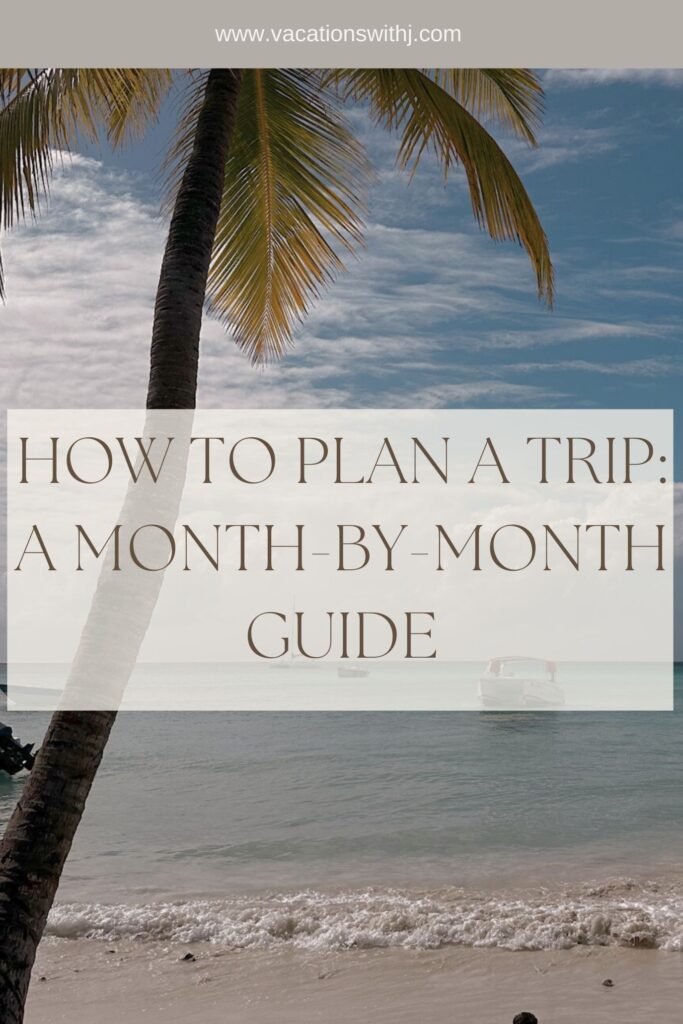How to Plan a Trip: A MONTH-BY-MONTH GUIDE
Table of Contents
Ever felt overwhelmed by the sheer number of details involved in trip planning? You’re not alone! As a seasoned traveller, I’ve learnt that with a little organisation, you can turn the planning process into an exciting adventure itself.
So, when’s the best time to start planning? The answer depends on the length and complexity of your trip. For spontaneous weekend getaways, a few weeks might suffice. However, for international adventures or group trips, it is wise to start planning several months in advance. I will also include useful Travel Resources to help you figure out transport options, insurance, finances, itineraries, accommodations and more.
To streamline the process, I’ve broken down the planning steps into a month-by-month guide. Let’s dive in!
Remember that flexibility is key! While this guide provides a general timeline, adjust it to suit your specific needs and preferences. By following this “How to Plan a Trip: Month-to-Month guide“, you’ll be well-prepared to start travel plans without the stress.

12 months
Planning a holiday once used to be a time-consuming task but no more once you follow this guide. This guide is here to show you how to navigate the planning process efficiently, starting with 12 months to go.
Buckle up, because we’re diving into the first crucial step of your year-long travel planning journey which is budget, travel expectations and interests. Have a budget in mind and draft out the non-negotiables of what you want to see, do and taste. Also decide how long you want to travel for too.
Here is how to research the costs:
1. Travel Guide – to research the areas and places. Using social media will help too (Instagram/Pinterest).
2. Google prices for activities you want to do or use Viator / Get Your Guide.
3. Use Skyscanner or Google Flights for cheap flight prices (signing up for email alerts for price changes).
4. Use Booking.com, Expedia or Hostelworld to research accommodation costs.
5. Check out your travel points for frequent flyers eg Virgin Red or AMEX points.
6. Create a local and global bucket list.
7. Time of the year, season, peak time etc.
Travel Credit Cards: Many cards offer extra points for travel purchases. Research cards with high travel rewards and consider opening a new one if it aligns with your spending habits. I managed to save up points for free cruises and other holidays so you can too!
Being 12 months out, this is a great place to start.
8 Months
Before proceeding further with your travels you will want to make sure your passports are in date. Secondly that they are still valid for at least 6 months after your trip ends as this can be a requirement by many countries. Renewals can take some time so avoid disapointments by sorting out these issues early.
Depending on the country also read up their specific government guidelines for travellers and see other documentations like a visa is needed. If so apply for that asap (VisaGuide.World). This includes making sure you get any mandatory medical vaccines or proof of previous vaccines in time for your travels.
Here are some helpful links:
- UK Passport Renewal: GOV.UK: Apply for a renewed passport: https://www.gov.uk/renew-adult-passport/renew
- US Passport Renewal: [US Department of State passport renewal ON U.S. Department of State (.gov) travel.state.gov]
- Travellers Health
6 Months
The 6 months mark is a good time to check flight prices and although they can go up or down, its best to start monitoring them. Lock in those cheap prices if you find them now. My go to website for flight comparison is:
Consider your budget when booking and so non-allocated seats will be cheaper or hand luggage only would be more cost effective. Weigh up what is best for you.
4 Months
Now we are a little closer, at 4 months you should look at booking your accommodation. If booking further in advance and you feel slightly uncertain about actually travelling, it is worth paying extra for cancellation cover. I have done this in the past if a cheaper offer came up closer to the time. Always read the fine print! My go to websites are:
If travelling on a budget you can use hostels or communities where short-term stays at people’s homes are an option.
Activities, excursions and adventures are next on the to do list! Plan out which days you want to do what, look at the admission fees, research what free things there are to do also to have a variety of options. Often attractions need to be pre-booked, so do this which can sometimes save money with early booking fees. When determining what times to do what activities I use the following websites:
Social media on the live platforms are useful when planning what you might be interested in. Whether you map out everything in detail or bookmark ideas, you will find this useful.
Do your research on City Passes for the cities you visit. These can allow for additional discounts and even free entries into desired attractions eg walking tours, museums and outdoor attractions. Note that some attractions give discounts for booking multiple attractions at the same time. Some examples are:
CityPASS: Available in various cities worldwide, CityPASS offers discounted entry to popular attractions at a bundled price.
2 Months
2 months out I like to plan my outfits and to make this easier, I need to know what the weather is like. I usually look on the met office for UK weather or Google for weather abroad. Consider that this can change a lot, but you get a rough idea. I tend to draft out my outfits and itinerary using Notion or Google docs.
Then pre-packing is something I do which allows me to establish if I need to buy any extra things for the trip ahead. Again I used Notion for a ‘To Buy’ List.
If you are renting a car, I would highly recommend you booking in advance. This is the same for trains. When it comes to buses, you can leave that for when you get there.
1 Month
The holiday is getting closer now so you need to put some things in place like insurance. Do not be blazay about this and make sure you are covered or it can inconveniently cost you a lot of money should something unfortunate happen eg theft or death. Check with your bank for insurance or a comparison website which can be found in my Travel Resources. Make sure you answer all the relevant medical questions, include all the gadgets you are travelling with that need covering and read the fine print which I have done for past cruises and ski trips. Yes, it can be expensive at times but it is better to be safe than sorry.
You should compare rates for travel currency if you want to take cash with you. Alternatively and what I rely on is my Monzo card which I load with cash and use this on my travels. With immediate conversion when spending and low foreign transaction fees and rates. I would recommend this. I would recommend you travel with a Credit Card also. Make sure to alert your bank about travels to avoid blocked cards and suspected freud.
7 Days
Exciting to know you planned holiday is around the corner, literally. It is now time to fine tune your packing. Refer to your ‘Must Pack‘ list and include the important bits. Do not forget to take medications/prescriptions you will need as they can be costly abroad. I even make a list of ‘Do not forget’ to check on up to the day of departure. These can be for things like sunglasses or toothbrush etc.
By using this month-to-month guide and travel tips, you will have a stress free planning experience.
Lastly enjoy your travels
Bon Voyage!


